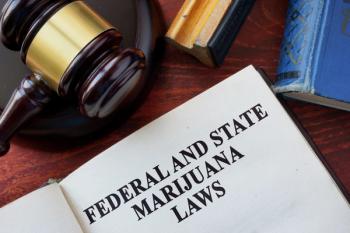
Develop a Plan for CBD Therapy
In a presentation from APhA2021, clinical pharmacist Danielle Fixon, PharmD, BCGP, BCPS, offers counseling tips for CBD products.
A session presented at the American Pharmacists Association (APhA) 2021 Annual Meeting and Exposition on March 12 offered pharmacist-centered guidance on the current cannabidiol (CBD) landscape, and methods of counseling on CBD products.
In the session, which was titled “The ABCs of CBD Products and Practices,” presenter Danielle Fixon, PharmD, BCGP, BCPS, assistant professor, geriatric clinical pharmacist from the University of Colorado Skaggs School of Pharmacy and Pharmaceutical Sciences, focused on how pharmacies can effectively develop a plan for helping patients who show signs of being good candidates for CBD and ensure the safe use of the product.
“Our patients are interested in CBD,” Fixon emphasized. According to a 2020 analysis of Google search trends, interest in CBD spiked closely after the Farm Bill was passed. As CBD increasingly piques the interest of the American public, pharmacists must be well-acquainted with the evidence supporting CBD use and the ways they can develop a plan of action for their patients interested in CBD therapy.
Current Evidence for CBD Use
Fixon highlighted that much of the research surrounding CBD, as well as THC, are inconsistent in products and dosage, and as a result, the findings have been largely inconclusive.
“That’s one of the biggest downfalls, I would say, with a lot of the evidence that we have for CBD-base products, or even THC, is that it’s a lot of patients that are using non-specific doses,” Fixon explained. So, we really need more research on…what dose is appropriate, how many times a day should patients take it, and really look at the efficacy of one product.”
The limited studies mentioned by Fixon focused on conditions such as Crohn disease, chronic pain, insomnia, and ocular hypertension and glaucoma. Taking into consideration these pitfalls, Fixon does not recommend CBD for these disease states.
Some studies have investigated the benefits that CBD may have on anxiety. Fixon noted that, to date, research has focused on alleviating anxiety through a 1-time dose. “Then [they] told patients to do public speaking for 2 to 4 minutes. They did find improvement in the patient’s anxiety, so, potentially, higher doses of CBD may be effective for anxiety-related to public speaking or social settings,” Fixon said. However, more research is still needed to gauge the potential benefits of long-term CBD use for anxiety.
Thus far, the CBD indication with the most supporting evidence is for pain. Overall, “CBD may decrease inflammation and pain. And in clinical practice, I would say I find that patients really have good benefit with using CBD for some of their pain syndromes,” Fixon said.
Assessing and Counseling Patients For CBD
Pharmacists should always start by recommending first-line therapies before CBD products, as current guidelines aren’t advocating the use of CBD or THC for first-line therapy. “They’re recommended for more of a rescue use,” Fixon explained.
Pharmacists should also review the patient’s current medications to weed out potential drug interactions, as well as discuss what route of administration––systemic or local––is best for that particular patient. Reviewing the patient’s medical history for disease-related concerns is also important, according to Fixon.
“If you decide that you are using a CBD product, our motto is start low, go slow. So, initiate at a low dose,” Fixon recommended. Another helpful tactic is to have the patient keep a cannabis log to examine what may be working, or, conversely, hindering progress. Fixon also recommended obtaining CBD products from a medical dispensary or state where CBD is legal.
Related:
Fixon additionally pointed to the following considerations when offering CBD products in your pharmacy:
- Check the label of the product to ensure it lists the CBD dose.
- As CBD products aren’t regulated, have patients ask for a Certificate of Analysis.
- Store the product in a locked location.
- High-calorie and high-fat meals can increase the concentration fivefold.
- Most common adverse effects include dry mouth, diarrhea, drowsiness, and fatigue.
Fixon concluded by stressing the importance of safety when recommending CBD products. “Medication assessment, including drug interactions, disease interactions, [are] really important before considering a cannabis product. Any of the products that are out there are not regulated by the FDA, so making sure patients are aware of that and report anything—any side effects or ill effects that occurs—is always good for us to know,” she said.
Reference
- Fixon D. The ABCs of CBD products and practices. Presented at: American Pharmacists Association 2021 Annual Meeting & Exposition; virtual; March 12-15,2021. Accessed March 12, 2021.
Newsletter
Pharmacy practice is always changing. Stay ahead of the curve with the Drug Topics newsletter and get the latest drug information, industry trends, and patient care tips.























